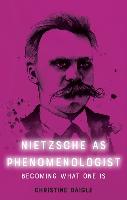A controversial interpretation of Nietzsche's philosophy as phenomenological that radically revises his ethical and political views Christine Daigle explores Nietzsche's phenomenological method, a 'wild phenomenology', to elucidate his understanding of the human being as an intentional embodied consciousness, as a being-in-the-world and as a being-with-others. Establishing this phenomenological conception of the human allows her to revisit the Nietzschean notions of free spirit and the Overhuman and how they express the ethical and cultural-political flourishing Nietzsche envisions for human beings. Daigle shows that reading Nietzsche as a wild phenomenologist entails a reinterpretation of his views on ethics and politics, specifically of the notions of free spirit, Overhumanity, and authentic flourishing, in the individual and socio-cultural sense. This daring reinterpretation of Nietzsche's philosophy resolves inconsistencies in scholarship and offers a thought-provoking take on his ethical and political views. Christine Daigle is Professor of Philosophy and Director of the Posthumanism Research Institute at Brock University, Canada. Cover image: (c) Barbara Melich, Watercolor Painting Cover design: riverdesignbooks.com [EUP logo] edinburghuniversitypress.com ISBN 978-1-4744-8784-9 Barcode

